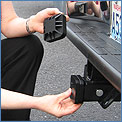Hitch locks are a valuable security measure for protecting your RV and trailer from theft. However, sometimes you may find yourself with a hitch lock that you can’t remove, leaving you stranded and frustrated. Fear not! In this comprehensive guide, we’ll provide clear and detailed instructions on how to remove a hitch lock with a key, ensuring you get back on the road swiftly and securely.

Image: www.hitchsafe.com
Unlocking the Secrets of Hitch Locks:
Types of Hitch Locks
Before delving into the removal process, it’s essential to understand the different types of hitch locks available. Common types include:
- Keyed locks: These locks require a physical key to operate.
- Combination locks: These locks use a series of numbers or dials to unlock.
- Puck locks: These locks use a slotted key that fits into a receiving slot.
While the removal process may vary slightly depending on the type of lock, the principles remain the same.
Step-by-Step Removal Process:
Now, let’s walk through the step-by-step process of removing a hitch lock with a key:
- Gather your tools: You will need your key, a lubricant (optional), and possibly a pair of pliers or a hammer (in rare cases).
- Locate the keyhole: Most hitch locks have a keyhole on the side. Find it and insert the key.
- Apply lubricant (optional): If the lock is particularly rusty or seized, you can apply a lubricant to the keyhole. This will help loosen the internal mechanism.
- Turn the key: Turn the key gently to the unlocked position. Avoid excessive force, as this may damage the lock.
- Remove the lock: Once unlocked, you should be able to pull the lock straight out of the hitch.
If you encounter any resistance, try applying more lubricant or tapping the lock gently with a hammer. However, avoid excessive force, as you don’t want to damage the hitch or the lock.

Image: www.carguideinfo.com
Troubleshooting Common Issues:
Here are some common issues you may face during the removal process and how to troubleshoot them:
- Key doesn’t fit: Ensure you have the correct key for the lock. If it still doesn’t fit, have a locksmith check it.
- Frozen lock: Lubricate the lock with a spray like WD-40 and let it penetrate. Use a hammer to tap gently around the lock’s base to loosen it up.
- Broken key: If the key breaks inside the lock, you may need to extract the remaining piece using needlenose pliers or consult a locksmith.
- Seized lock: If the lock is incredibly seized, soak it in a penetrating oil overnight. If that doesn’t work, a locksmith may be required.
Expert Tips and Advice:
Here are some expert tips to make the removal process easier and more effective:
- If the lock is new or hasn’t been used in a while, it may be stiffer than usual. Exercise patience and turn the key gently.
- It’s advisable to regularly lubricate your hitch lock to prevent seizing. This will make future removals easier.
- Consider using a torque wrench if you need additional leverage. However, be cautious not to overtighten the lock.
- If you have lost your key, a locksmith can create a new one for you by decoding the lock.
FAQs on Hitch Lock Removal:
Here are some commonly asked questions regarding hitch lock removal:
- Q: Can I use pliers to remove a hitch lock?
A: It’s not recommended as pliers can damage the lock. Only use pliers gently in challenging situations. - Q: What if I can’t remove the lock with the key?
A: Seek professional help from a locksmith or refer to the troubleshooting tips above. - Q: How often should I lubricate my hitch lock?
A: It’s a good practice to lubricate your lock every six months or as needed.
How To Remove Hitch Lock With Key
Conclusion:
Mastering the art of removing a hitch lock with a key is an essential skill for RV and trailer owners. By following the detailed instructions and expert advice outlined in this guide, you can promptly and safely unlock your hitch, ensuring a smooth and hassle-free journey ahead. If you encounter any difficulties, don’t hesitate to reach out to a locksmith for professional assistance.
Are you a seasoned RVer or trailer enthusiast? Share your tips and experiences with our readers in the comments below. Your insights could prove invaluable to others facing similar situations.